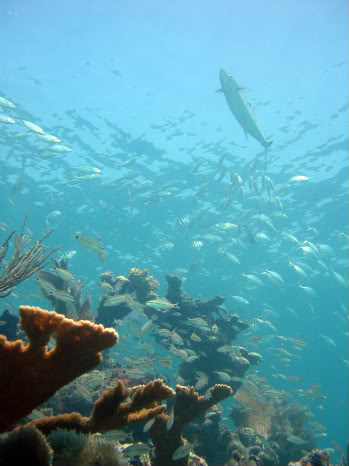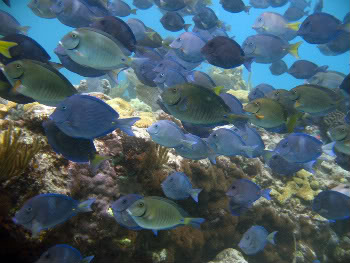Analyzing 48 surveys of Caribbean fish populations over fifty years, from 1955-2007, a new meta-study has found that fish populations in the famously clear waters began to drop in the mid-90s, leading to a consistent decline that hasn’t stopped.
The study published in Current Biology discovered a region-wide decline of about 3-6 percent per year in three out of six trophic groups of fish, i.e. groupings of species categorized by their place on the food chain. The declines didn’t show major differences between species targeted by fishermen and those that are not, implying that overfishing isn’t the only cause of the decline in the Caribbean. Dr. Michelle Paddack, lead author of the paper, speculates that their findings point to habitat degradation, specifically of coral reefs, as the primary cause. However there has been a lag-time between the decline in coral reefs and the subsequent decline in fish.
 Beneath Caribbean waters. Photo by: Michelle J. Paddack. |
“Caribbean coral reefs have experienced drastic losses in the past 30 years – previous research revealed that live coral in the Caribbean has declined 80 percent since 1977. This loss may not have initially impacted fish because the structural complexity of reefs may have been slow to decline,” Paddack explains. “When coral is first killed, by for example bleaching or disease, the coral skeleton is still intact. Fishes use the structure of corals for shelter, so at first, they may not be greatly impacted by the fact that the coral is dead. However, if no new coral recruits to replace the dead coral, the coral skeleton will begin to become covered in algae, erode and break apart – due to water motion, storms, and bioeroding animals such as boring sponges. This may be making reefs less structurally complex, resulting in fewer places of refuge for fish from predation, and fewer spaces for prey to occur.”
While habitat degradation seems to be the largest contributor to the decline, Paddack emphasizes that overfishing is probably still involved: “some fishing may not seriously deplete stocks, but when combined with declining habitat conditions or food resources, the impact on the fish population may suddenly be too great.”
The decline in fish populations, especially of herbivores, is expected to greatly impact the ecosystem. Herbivores are essential in allowing coral reefs to recover; without herbivores, corals may not return from the brink in the Caribbean.
“For example,” Paddack says, “parrotfish play an important role in keeping algae away. Declines in these fishes can negatively impact corals because as grazing decreases, macroalgae can grow on reefs, and thus damage living corals (by smothering, shading, and microbes) and limit recruitment of new corals by taking up valuable space. Since corals form the building blocks of reefs, this can result in degradation of the whole system. Other fishes, such as planktivores and predators, are important in that they serve as linkages of energy, pulling resources into the reefs from the open water and helping to maintain high diversity via predation.”
 Surgeonfish in the Caribbean. Photo by: Michelle J. Paddack. |
While coral reefs began declining in the mid-1970s in the Caribbean, fish populations did not follow for another 20 years. While a lag-time is expected, the pattern is surprisingly dissimilar from population declines of fish in the Indo-Pacific, which had fish populations dropping within 5 to 10 years after widespread coral reef mortality.
“It does appear that fish in the Caribbean are slower to respond to coral death than in the Indo-Pacific. This may be because in the Caribbean there are fewer fish that are directly dependent on corals, whereas many are in the Indo-Pacific. It may also be because the Caribbean has fewer species of branching and structurally complex corals, which are abundant in the Indo-Pacific,” Paddack says. “So the fishes in the Caribbean may be more resilient to the loss of structural complexity (to a point) because they are more adapted to this type of system. The finding that they are now in a state of decline is very important, because it highlights that things have reached a critical point and need to be addressed.”
Describing this point as “the straw the broke the camel’s back”, Paddack sees this as an opportunity for Caribbean nations to seriously address issues related to coral reef and fish decline.
“The Caribbean is being affected on an ecosystem-wide level – this creates a challenge because this ecosystem is governed by over 20 nations and dependent territories. A unified management plan will be a huge challenge. But until then, actions of individual countries and territories can make a big difference,” Paddack says. She points to the tiny island of Bonaire, home to about 15,000 people, which “has instituted a diver awareness program and has restricted anchoring on their coral reefs to ensure that everyone who works or visits those waters is doing the least damage possible. The result is an informed public (residents and tourists alike) who is engaged in reef protection – and that makes a difference.”
Paddack says that nations have a number of means to promote recovery of fish populations in the region, which are vital for sustaining tourism, the fishing industry, and a healthy marine ecosystem. She recommends “reducing fishing or implementing fishing practices that are not destructive to reefs; establishing marine protected areas to alleviate stress from fishing; mitigating global warming by reducing CO2 emissions; establishing mooring balls and limiting anchoring on reefs; keeping boat traffic further offshore and in designated shipping channels so that boat groundings are less likely to occur on coral reefs; re-establishing corals in areas where corals have died.”
Ultimately, Paddack points out, it is up to society to decide whether or not it wants to save the fish of the Caribbean: “what will turn things around is the awareness of people to the grave losses that are occurring on reefs and their desire to save them, translating into actions that move from personal to affecting how we sustainably manage these beautiful and important ecosystems.”
CITATION: Michelle J. Paddack, John D. Reynolds, Consuelo Aguilar, Richard S. Appeldoorn, Jim Beets, Edward W. Burkett, Paul M. Chittaro, Kristen Clarke, Rene Esteves, Ana C. Fonseca, Graham E. Forrester, Alan M. Friedlander, Jorge Garcı´a-Sais,Gaspar Gonzalez-Sanso´n, Lance K.B. Jordan, David B. McClellan, Margaret W. Miller, Philip P. Molloy, Peter J. Mumby, Ivan Nagelkerken, Michael Nemeth, Rau l Navas-Camacho, Joanna Pitt, Nicholas V.C. Polunin, Maria Catalina Reyes-Nivia, D. Ross Robertson, Alberto Rodrıguez-Ramırez, Eva Salas, Struan R. Smith, Richard E. Spieler, Mark A. Steele, Ivor D. Williams, Clare L. Wormald, Andrew R. Watkinson, and Isabelle M. Cote (2009). Recent Region-wide Declines in Caribbean Reef Fish Abundance. Current Biology, Volume 19, Number 7.
Related articles
New protections for coral reefs and dwindling fish species in Belize
(04/27/2009) Coral reefs in Belize, considered to be some of the most pristine in the west, have secured additional protections. Rene Montero, the Minister of Agriculture and Fisheries, signed a set of new laws this month to protect Belize’s coral reefs and the fish that inhabit them. The additional laws protect increasingly overfished species, ban spearfishing in marine reserves, and create no-take zones, according to a press release from the Wildlife Conservation Society (WCS).
Tropical ocean dead zones could increase 50 percent by 2050
(11/18/2008) If carbon dioxide levels continue to rise as expected, marine dead zones in the tropics are expected to increase by 50 percent in just over four decades, according to a new study from the Leibniz Institute of Marine Sciences in Germany. The expansion of marine dead zones in tropical seas could have devastating impacts on ocean ecosystems and fisheries.
A solution to worldwide fishery collapse?
(09/18/2008) In November 2006 a study on global fisheries received a lot of attention: employing 53 years worth of fishery data, Boris Worm predicted that by 2048 the ocean would be empty of fish. Essentially there would be nothing left to catch. Already, Worm reported, fishing stocks had collapsed in 29 percent of the world’s fisheries. Although scientists called for rapid and overhauling changes to fisheries, the fishing industry carried on business-as-usual. Now, two years later, a study in Science proposes to have found the solution to the global fishery-collapse.







